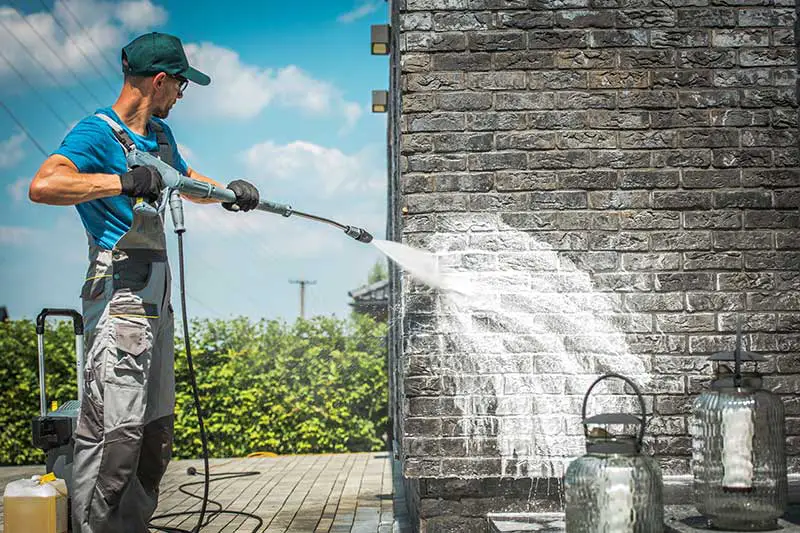For your pressure washer, use a soap specifically designed for pressure washer applications. Ensure it’s compatible with your machine and suitable for the cleaning task at hand.

Understanding Pressure Washer Soap Types
Pressure washer soaps come in several types, each formulated for specific cleaning tasks. The most common soap categories include:
- General-purpose cleaners: Suitable for a wide range of surfaces, like decks, patios, and driveways.
- Vehicle cleaners: Formulated for cleaning cars, trucks, and boats without damaging paint or finishes.
- Deck and fence cleaners: Designed to remove mold, mildew, and algae from wooden surfaces.
- Concrete cleaners: Made to clean and remove stains from concrete surfaces.
- Siding cleaners: Ideal for cleaning various siding materials, including vinyl, wood, and aluminum.
“Choose a soap that is specifically formulated for your cleaning task to ensure optimal results.”
Selecting the Right Soap for Your Task
Before choosing a pressure washer soap, consider the following factors:
- Surface material: Determine the type of surface you’ll be cleaning, as different soaps are designed for specific materials.
- Stains and contaminants: Identify the stains and contaminants you need to remove, like grease, mold, or dirt.
- Soap compatibility: Check your pressure washer’s manual for soap recommendations and compatibility guidelines.
- Environmental impact: Look for eco-friendly soap options if you’re concerned about the environment.
Table: Soap Types and Their Applications
| Soap Type | Best for Cleaning |
|---|---|
| General-purpose | Decks, patios, driveways |
| Vehicle | Cars, trucks, boats |
| Deck and fence | Wooden surfaces |
| Concrete | Concrete surfaces |
| Siding | Vinyl, wood, and aluminum siding |
Compatible Soaps for Various Pressure Washers
Not all pressure washer soaps are compatible with every pressure washer. To ensure optimal performance and avoid damage, follow these guidelines:
- Check your pressure washer’s manual: Refer to your owner’s manual for soap compatibility and usage instructions.
- Use pressure washer-specific soaps: Avoid using household cleaning agents or detergents, as they may harm your pressure washer or the surface you’re cleaning.
- Detergent tanks and siphon tubes: Some pressure washers have built-in detergent tanks, while others use siphon tubes to draw soap from an external container. Make sure your soap is compatible with your pressure washer’s soap dispensing system.
“Always refer to your pressure washer’s manual for soap compatibility and usage instructions.”
Environmentally Friendly Soap Options
Eco-friendly pressure washer soaps are an excellent choice for those looking to minimize their environmental impact. These soaps are biodegradable and free of harmful chemicals, making them safer for plants, animals, and water sources. Some popular environmentally friendly soap options include:
- Simple Green: A biodegradable, non-toxic, and phosphate-free cleaner suitable for various surfaces.
- Krud Kutter: A water-based, biodegradable cleaner that removes tough stains without harming the environment.
- EcoClean Solutions: A plant-based, biodegradable cleaner designed for various cleaning tasks.
Table: Environmentally Friendly Soap Brands
| Brand | Features |
|---|---|
| Simple Green | Biodegradable, non-toxic, phosphate-free |
| Krud Kutter | Water-based, biodegradable |
| EcoClean Solutions | Plant-based, biodegradable |
Proper Soap Dilution and Usage
To ensure effective cleaning and avoid damaging surfaces or your pressure washer, follow these soap dilution and usage tips:
- Read the soap’s label: Each soap has specific dilution instructions. Follow the manufacturer’s guidelines to create the correct soap-to-water ratio.
- Use a low-pressure nozzle: When applying soap, use a low-pressure nozzle to avoid etching or damaging surfaces.
- Allow soap to sit: Let the soap sit on the surface for a few minutes to break down dirt and stains, but don’t let it dry.
- Rinse thoroughly: After allowing the soap to sit, switch to a high-pressure nozzle and rinse the surface thoroughly to remove soap residue and loosened dirt.
“Follow the manufacturer’s guidelines for proper soap dilution, and always rinse surfaces thoroughly after cleaning.”
Storing and Handling Pressure Washer Soaps
Proper storage and handling of pressure washer soaps help maintain their effectiveness and ensure a longer shelf life. Here are some tips for storing and handling your pressure washer soaps:
- Store in a cool, dry place: Keep your soaps in a cool, dry location away from direct sunlight or heat sources to prevent degradation.
- Keep containers sealed: Ensure containers are tightly sealed to prevent contamination or evaporation.
- Label containers: Clearly label soap containers to avoid confusion and prevent accidental mixing with other cleaning agents.
- Dispose of old or expired soaps: Over time, soaps can lose their effectiveness. Check the expiration date and dispose of old or expired soaps according to local waste disposal regulations.
“Store pressure washer soaps in a cool, dry place with containers tightly sealed to maintain their effectiveness.”
Key Takeaways
- Pressure washer soaps are specifically designed for pressure washer use and are not interchangeable with household cleaning agents.
- Choose the right soap for your task, considering factors such as surface type, dirt level, and environmental impact.
- Always refer to your pressure washer’s manual for soap compatibility and usage instructions.
- Opt for environmentally friendly soaps when possible to minimize your environmental impact.
- Follow the manufacturer’s guidelines for proper soap dilution, application, and rinsing.
- Store and handle pressure washer soaps properly to maintain their effectiveness and prolong shelf life.
Conclusion
Using the right soap in your pressure washer is crucial for effective cleaning and maintaining your equipment. By understanding the different types of soaps available, selecting the appropriate one for your task, and following proper usage and storage guidelines, you can achieve optimal cleaning results while minimizing any potential harm to your pressure washer, surfaces, or the environment.
